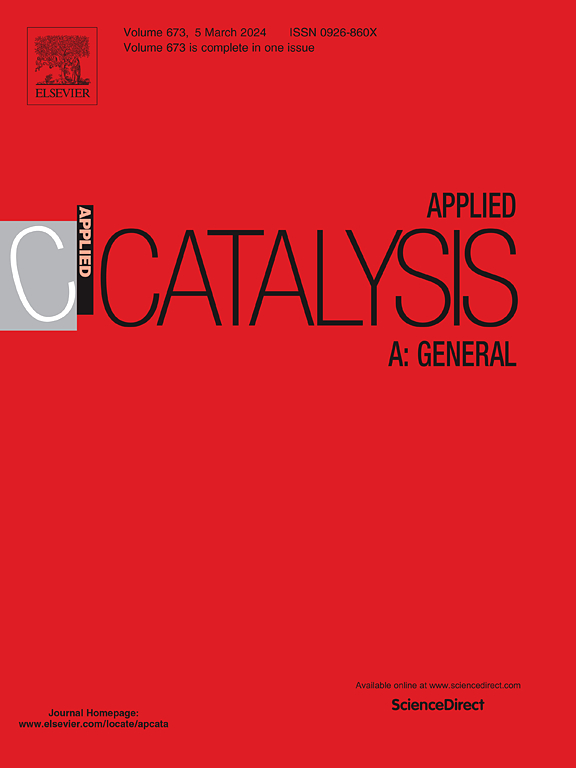使用贝塔沸石支撑的氧化 MoOx 催化剂将葡萄糖外聚为稀有糖类
IF 4.7
2区 化学
Q2 CHEMISTRY, PHYSICAL
引用次数: 0
摘要
从木质纤维素生物质中提取的丰富单糖的表聚物为合成稀有糖类提供了一种极具吸引力的方法。钼基催化剂具有出色的葡萄糖-甘露糖表聚性能,但大多数研究都忽略了其他糖类表聚物的合成及其形成途径。在此,我们研究了钼负载量为 1.5-10 wt% 的还原β沸石支撑氧化钼催化剂(Mo/Beta)在水中的葡萄糖表聚作用,特别关注了稀有糖类阿洛糖和阿洛糖的形成。研究人员详细考察了催化剂的理化结构和催化活性,并通过核磁共振(NMR)光谱探测了表聚物形成的反应机理。结果表明,当反应温度低于 140 ℃ 时,5 wt% 的 Mo/Beta 在 10 分钟内就能从葡萄糖中获得 30% 的近平衡甘露糖产率,并表现出相对较低的活化能(∼67 kJ mol-1)。在较高的反应温度下(≥ 120 °C),稀有糖类阿洛糖和阿曲糖在 140 °C的累积总产率为 24%。利用核磁共振光谱进行的同位素标记研究证实,催化作用涉及 1,2 碳位移,在足够高的温度下会形成稀有糖。对催化剂再利用和再生的评估表明,支撑的 MoOx 比 MoO3 具有更高的稳定性,但 Mo/Beta 催化剂在水热条件下的稳定性还有待提高。本文章由计算机程序翻译,如有差异,请以英文原文为准。
Epimerization of glucose to rare sugars using Beta zeolite-supported MoOx catalysts
Epimerization of abundant monosaccharides derived from lignocellulosic biomass offers an attractive approach for the synthesis of rare sugars. Molybdenum-based catalysts demonstrate excellent glucose-mannose epimerization performance, but most studies have neglected the synthesis of other sugar epimers and the pathways of their formation. Here, reduced Beta zeolite supported MoOx catalysts (Mo/Beta) with 1.5–10 wt% Mo loading were examined for glucose epimerization in water, specifically focusing on the formation of the rare sugars allose and altrose. The physicochemical structure and the catalytic activity of the catalyst were examined in detail, and the reaction mechanisms for the epimer formation were probed by nuclear magnetic resonance (NMR) spectroscopy. The results demonstrate that 5 wt% Mo/Beta achieved a near-equilibrium mannose yield of 30 % from glucose within 10 min at reaction temperatures below 140 °C, exhibiting a relatively low activation energy (∼67 kJ mol−1). At elevated reaction temperatures (≥ 120 °C), the rare sugars allose and altrose accumulated to combined yields of 24 % at 140 °C. An isotope labelling study using NMR spectroscopy corroborated the catalysis to involve 1,2-carbon shifts that elicit the formation of rare sugars at sufficiently high temperatures. Evaluation of catalyst reuse and regeneration indicated that supported MoOx had higher stability than MoO3, but the stability of the Mo/Beta catalysts under hydrothermal conditions leaves room for improvement.
求助全文
通过发布文献求助,成功后即可免费获取论文全文。
去求助
来源期刊

Applied Catalysis A: General
化学-环境科学
CiteScore
9.00
自引率
5.50%
发文量
415
审稿时长
24 days
期刊介绍:
Applied Catalysis A: General publishes original papers on all aspects of catalysis of basic and practical interest to chemical scientists in both industrial and academic fields, with an emphasis onnew understanding of catalysts and catalytic reactions, new catalytic materials, new techniques, and new processes, especially those that have potential practical implications.
Papers that report results of a thorough study or optimization of systems or processes that are well understood, widely studied, or minor variations of known ones are discouraged. Authors should include statements in a separate section "Justification for Publication" of how the manuscript fits the scope of the journal in the cover letter to the editors. Submissions without such justification will be rejected without review.
 求助内容:
求助内容: 应助结果提醒方式:
应助结果提醒方式:


